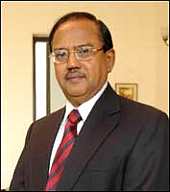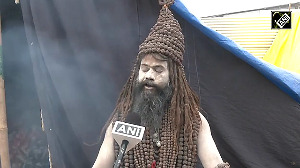 The November 26 terrorist attacks in Mumbai last year revealed the chinks in India's security setup. From poor intelligence to lack of preparedness, a lot was spoken on how to prevent another carnage of this magnitude.
The November 26 terrorist attacks in Mumbai last year revealed the chinks in India's security setup. From poor intelligence to lack of preparedness, a lot was spoken on how to prevent another carnage of this magnitude.
Ajit Kumar Doval, former director of the Intelligence Bureau , discusses with rediff.com's Vicky Nanjappa the intelligence scenario post 26/11. Doval says it is 'ridiculous' that the Mumbai police is still in denial about a local link in the deadly attacks.
Do you think that the capabilities of the Intelligence Bureau have changed in the aftermath of 26/11?
Capabilities of the intelligence agencies do not change overnight. The IB is constantly upgrading its skills and capabilities -- both operational and analytical -- to meet new challenges. Structural changes are also being brought about when required.
Our adversaries are changing and multiplying at a very fast rate. However, the changes that the agency makes do not necessarily and proportionately reduce threat levels. In fact, there is a marked improvement in its functioning. But both the direction and speed of the change calls for an orbital shift.
Could you please explain the concept of 'change'?
The construct of change in India is reformative in nature. When there is a failure and mistakes are detected, reforms are brought about to ensure that those mistakes are not repeated. However, I feel that the changes in the framework of reformation, though necessary, are inadequate.
Take the Mumbai attacks for instance in which five-star hotels were attacked. The change in security systems and drills in hotels across the country may make the hotels secure but do not reduce the overall terrorist threat. A terrorist outfit may not necessarily carry out an attack on hotels again. There is a need to change so as to cope with the changing capabilities and intentions of terrorists. There is a need for a forward-looking approach.
If we assess that a terrorist organisation will strike with weapons of mass destruction, then there is a need to gear up for that too. They may even think of hitting at defence and nuclear installations. Terror groups keep improvising and modifying their field craft to surprise the adversary. And, when they fail to do so -- they get surprised and are neutralised.
They keep changing their targets, their modus operandi and may even use people from another country to carry out a terror strike. The construct of change should be transformative. Change your techniques, technology and tradecraft fast and on unpredictable lines -- not necessarily linked to the last failure.
Time-tested methods have no place in the game of intelligence -- the trick lies in ever inventing something new and something least expected. Be innovative enough to remain a step ahead of them. And that requires ability to think like a terrorist and changing innovatively and imaginatively.
There was a lot spoken about the local angle in the Mumbai attack. However, the Mumbai police refuses to acknowledge this. What is your opinion?
For millenniums we did not know the existence of uranium in nature. That did not mean that there was no uranium. An operation of the scale of 26/11 could not have been carried out by semi-literate foreign terrorists in an alien setting with so much of precision, sense of time direction and space without local support.
Just because the Mumbai police was not lucky or smart enough to find something about this that does not mean that the local angle was non-existent.
Let us analyse all major, or even minor, incidents of terrorism perpetrated by the foreigners in the past and see how many were there without local support.
Do you think that there is still scope to probe the local angle?
I think the battle ends only when we win. The effort should continue; and I think there is still scope for this.
Do you think Pakistan is under any pressure to act against terrorism? Do you think that they have acted on it?
As far as India is concerned, Pakistan is not under any real pressure. Over the years, Pakistan has developed immunity to international condemnation. It is not bothered about the sullying of its image. The tangible pressure is only for taking surgical actions against the groups or individuals, who potentially can hit Western interests or targets. I don't think that there is any pressure on them to shut down India specific terror camps, prevent infiltration, take action against the gun runners, currency counterfeiters or India linked radical organisations.
Although I do feel that there is a desire on the part of the Western countries to make Pakistan and Afghanistan terror-free states. India, unfortunately, does not figure high in the pecking order.
What about the Lashkar-e-Tayiba? Do you think that they have disintegrated after the Mumbai attack?
Not at all! The LeT has not been subjected to any degradation though it has been tactically advised to lie low following international pressure. Their infrastructure, sources of funding, catchments for new recruitment and religious schools under Markaz-Dawa-ul-Irshad to produce jihadis, production of jihadi literature, sources for procurement of weapons, etc. are very much intact.
What about outfits like the Students Islamic Movement of India and the Indian Mujahideen? They are relatively quiet as of now. Does this mean they are finished?
The SIMI and IM are very much present; they have not vanished. Maybe as a group they may not be as well organised and active as before. However, there are individuals who still maintain their trans-national linkages and can be exploited by forces inimical to India
There has been a rise in incidents involving Hindu organisations. What do you have say about this?
I do not think there is any serious possibility of any Hindu organisations taking to violence in a big way. However, any such trend must be countered and curbed.






 © 2025 Rediff.com -
© 2025 Rediff.com -